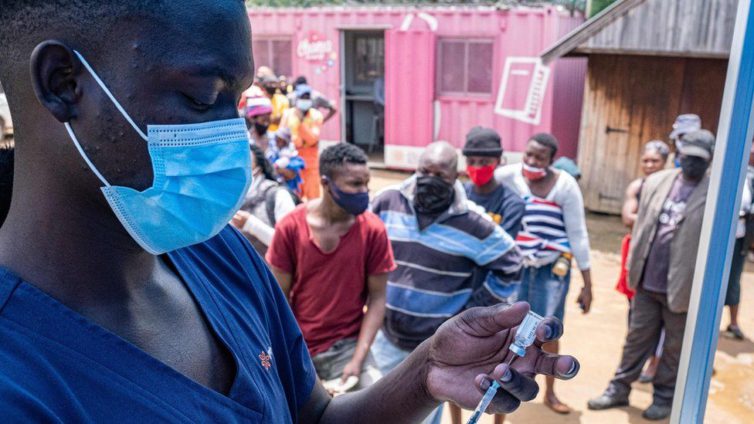The new coronavirus variant Omicron is spreading across the globe at an unprecedented rate, the World Health Organization (WHO) has warned.
Cases of the heavily mutated variant have been confirmed in 77 countries.
But at a press conference, WHO chief Tedros Adhanom Ghebreyesus said it was probably in many others that had yet to detect it.
Dr Tedros said he was concerned that not enough was being done to tackle the variant.
"Surely, we have learned by now that we underestimate this virus at our peril. Even if Omicron does cause less severe disease, the sheer number of cases could once again overwhelm unprepared health systems," he said.
The Omicron variant was first identified in South Africa in November, and the country has since seen a surge in infections. President Cyril Ramaphosa has tested positive for Covid-19 and is currently isolating with mild symptoms.
A number of countries have introduced travel bans affecting South Africa and its neighbours following the emergence of Omicron, but this has failed to stop it from spreading around the world.
In the press conference on Tuesday, Dr Tedros reiterated concerns about vaccine inequity, as some countries accelerate rollouts of a booster shot in response to Omicron.
Recent studies of the Pfizer/BioNTech vaccine showed it produced far fewer neutralising antibodies against Omicron than against the original strain, but that this deficit could be reversed by a third, booster, jab.
Dr Tedros said boosters "could play an important role" in curbing the spread of Covid-19, but that it was "a question of prioritisation".
"The order matters. Giving boosters to groups at low risk of severe disease or death simply endangers the lives of those at high risk who are still waiting for their primary doses because of supply constraints," he said.
Supplies to the global vaccine-sharing programme Covax have increased in recent months.
However, world health officials fear a shortfall of tens of millions of doses - like the one which occurred in the middle of this year when India suspended its vaccine exports - could happen again.
In poorer countries, some vulnerable people are yet to receive a single dose.
Latest Stories
-
Rainstorm wreaks havoc in Akatsi South
24 minutes -
D-Black clears the air on fight between his crew and client at RNAQ40
36 minutes -
ACEYE releases IGIPTEP report, assessing the performance of Ghana’s government institutions
1 hour -
Photos: Mahama observes Eid Al-Fitr with Muslim community at Black Star Square
2 hours -
Bono Regional Minister rallies Muslims support towards galamsey fight
2 hours -
Russia still ‘working with US’ after Trump says he is ‘angry’ with Putin
2 hours -
Trade Ministry pledges commitment to agricultural transformation at UKGCC Grand Challenge Programme
3 hours -
NLA’s Chief Internal Auditor honoured at the Ghana Executive Management Awards
3 hours -
African Forest Forum launches AY4F platform to empower young forestry professionals
3 hours -
A Rocha Ghana warns of devastating impact of L.I. 2462 amendment
4 hours -
Experts call for stricter enforcement of Land Act amid rising land disputes
4 hours -
Ghana is a nation blessed with religious harmony – President Mahama
4 hours -
Stop building on waterways to avoid havoc – President Mahama
4 hours -
Korean star Kim Soo-Hyun denies accusations by late actress’ family
4 hours -
Betis should crowdfund to extend Antony loan – Isco
4 hours

